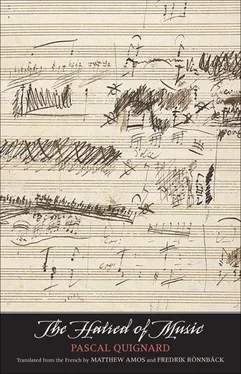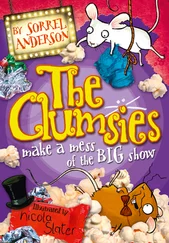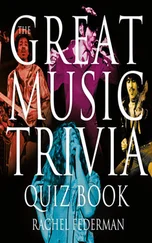Perhaps it is not the nationality of the works that should be sanctioned in music, but the origin of music itself. Originary music itself.

Formerly, philologists claimed that bell 2 could be derived from bellum —that the resounding and petrifying bell derived from war.
R. Murray Shafer reports that during the Second World War the Germans confiscated thirty-three thousand bells in Europe and melted them down in order to make cannons. Once peace was restored, temples, cathedrals, and churches reclaimed their property; the cannons of defeat were delivered to them. Pastors and priests melted them down to make them bells again.
The bell is derived from the animal. The English word bell comes from bellam , to bellow. The bell is the bellowing of man.

Goethe, at the age of seventy-five, wrote: “Military music unfolds me like an opening fist.”

In the cloister of San Marco in Florence there is an intrusive bell.
It is a bronze bell with a broken black and red wooden beam, placed on the ground before the door of the chapterhouse, in the quiet courtyard of the monastery.
It is called the Piagnona . It was the bell that summoned the crowd, which stormed the convent to take Savonarola away.
As a sign of atonement, the bell was exiled to San Salvatore al Monte and thrashed the entire length of its journey.

The Nuremberg tribunal should have ordered Richard Wagner to be beaten in effigy once a year in the streets of every German town.

Patriotic music is an infantile imprint; it sweeps one away like an overpowering jolt, a shiver bristling up and down the spine, filling with emotion, with a surprising adhesion.
Kasimierz Gwizdka wrote: “When the prisoners of the Konzentrationslager at Auschwitz, exhausted from their day of labor, stumbling along in marching columns, heard in the distance the orchestra playing at the gates, they quickly found their feet again. The music gave them extraordinary courage and strength to survive.”
Romana Duraczowa said: “We’re returning from work. The camp is approaching. The Birkenau camp orchestra is playing popular foxtrots. The orchestra infuriates us. How we hate that music! How we hate those musicians! Those dolls are seated, clad in navy blue dresses with a little white collar. Not only are they seated but they are allowed chairs! The music is supposed to rejuvenate us. It mobilizes us like the sound of a trumpet during a battle. The music even stimulates the dying nags who move their hoofs to the rhythm of the dance being played.”

Pindar, Pythian , I, 1.
“Golden lyre that the step obeys.”

Simon Laks wrote that it seemed to him that hearing music exerted a depressing effect on extreme misfortune. When he conducted it, it seemed to him that it added the passivity that it induced to the physical and moral prostration to which hunger and the smell of death destined the bodies of the other prisoners. He adds: “Certainly, during the Sunday concerts some of the spectators around us enjoyed listening to us. But it was a passive pleasure, without participation, without reaction. There were also some who cursed us, who insulted us, who looked down on us, who considered us as intruders who did not share their fate.”

Thucydides, echoing the opening of Pindar’s first Pythian , identified marching in step as a function of music: “Music is not destined to inspire a trance in humans but to allow them to march in step and to stay in close formation. Without music, a battle line runs the risk of being disrupted as it advances for the charge.” Elias Canetti repeated that the origin of rhythm was walking on two feet, giving rise to the metric of ancient poems. Human walking on two feet, pursuing the trampling of the prey and of the herds of reindeer, then of bison, then of horses. He saw the tracks of animals as the first text to be deciphered by the humans who followed them. Tracks are the rhythmic notation of noise. Trampling the ground in large numbers is the first dance, and it did not originate with humans.
Still in our days: it is the entrance of the human mass, trampling en masse the floor of a concert or ballet hall. Then, they all fall silent and come together by denying themselves all bodily noises. Then, they all clap their hands rhythmically, shouting, creating a great ritual clamor and finally, all rising together, once again as a mass they trample the floor of the hall where the music was performed.
Music is related to the pack of death. Heeling: that is what Primo Levi discovered when he first discovered the music played in the Lager .

Tolstoy remarks: “Where one wants to have slaves, one must have as much music as possible.” These words struck Maxim Gorky. They are quoted in Conversations at Yasnaya Polyana .

The unity of the funeral pack is in its trampling. Dancing cannot be distinguished from music. The effective cry, the whistle — residues of the birdcall — accompany the murderous heeling. Music gathers the packs like orders make them stand up. Silence breaks up packs. I prefer silence to music. Language and music belong to a genealogy that still persists and that can turn one’s stomach.
Orders are the oldest roots of language: dogs obey orders, as do humans. An order is a death sentence that the victims understand to the point of obedience. Domesticating and ordering are the same thing. Human children are first and foremost harassed by orders; which is to say that they are harassed by cries of death dressed in language.

Slaves are never objects but always animals. Dogs are no longer altogether animals but already servants because they are obedient: they hear, they respond to the voice-birdcall, they seem to understand the meaning even though it serves only to subject them to the melos .

Music enchants the soul and accentuates actions like the signals that Pavlov addressed to his dogs.
The conductor’s baton silences the cacophony of the instruments; it installs a silence that awaits music; against this background of deathly silence it suddenly causes the eruption of the first measure.
A pack of humans or animals, or even dogs, is always wild.
It is only domesticated when it responds to orders, rises at the sound of the whistle, and crowds together in halls and pays.

Children and dogs jump up and down when they find themselves at the edge of the waves. They spontaneously shout and yelp because of the noise and the movement of the sea.

Читать дальше













